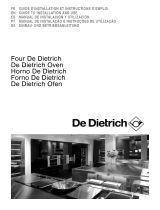english
enamel.
— Do not place heavy weights on the
open oven door, and make sure that
children are able neither to climb nor
sit on it.
— Do not use your oven as a larder or
to store any items after use.
— After using your oven, make sure
that all the controls are in their stop
position.
— Before beginning a pyrolysis
cleaning cycle in your oven, remove all
parts of your grids, trays and
accessories and remove major spill
residue.
— During cleaning, the surfaces may
become warmer than under normal
conditions of use. It is advisable to
keep children away from the
appliance.
— Do not use a steam cleaner.
— The oven must be turned off when
cleaning inside the oven.
— Before removing the glass
window, allow the appliance to cool
down.
— Before removing the back wall, the
appliance must be powered off. After
cleaning, the back wall must be put
back in place in accordance with the
instructions.
— Do not use abrasive cleaning
products or hard metal scrapers for
cleaning the oven’s glass door, which
could scuff the surface and cause the
glass to shatter.
WARNING:
Make sure the appliance is
disconnected from the power before
replacing the lamp in order to avoid
the risk of electric shock.
Whether a external disturbance
occurs in mains the appliance can
stop the current cooking or cleaning
cycle and the display can be switched
off for few seconds. After that the
program can be launched again by
the user.
Caution:
You must enable the appliance
to be disconnected from the supply
network after installation.
Disconnection can be enabled by
ensuring that there is an accessible
power plug or by incorporating a
switch into the fixed wiring in
compliance with the installation rules.
If the power cable is damaged, it
should be replaced by the
manufacturer, its after-sales service
department or a similarly qualified
person to avoid danger.
This appliance may be installed either
under a worktop or in a cabinet
column, as indicated on the
installation diagram.
Centre the oven in the unit so as to
ensure a minimum distance of 10 mm
between the appliance and the
surrounding unit. The material of the
unit supporting the appliance must be
heat-resistant (or covered with a
heat-resistant material). For greater
stability, attach the oven to the unit
with 2 screws through the holes
provided on the side panels.









